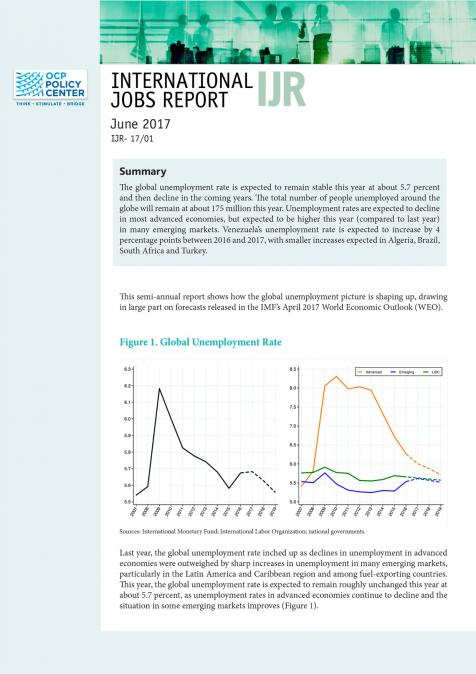Publications /
Opinion
Councilwoman Roxy Ndebumadu is a technology entrepreneur, and special advisor on beneficial AI, online safety and emerging technology. As a two term-elected official, she represents the City of Bowie, the fifth largest city in Maryland.
She is also a 2023 alumna of the Atlantic Dialogues Emerging Leaders program. Learn more about her here.
Amidst the churning tides of globalization, in which currents of tradition meet the winds of change, there is a call for a new international contract—a covenant not only between nations, but with the very essence of human flourishing at its center, redefining the approach to global investment. Let’s confront the reality: our current outcomes are not merely a fallout from economic challenges exacerbated by global disruptions; they stem from short-sightedness. Last year, at the Policy Center for the New South’s 12th Atlantic Dialogues, issues of brain drain and geopolitical tensions took center stage in discussions between prestigious speakers, prompting us to ask why. It's because leaders worldwide continue to tackle isolated outcomes of a distorted society, born from globalization and the industrial revolution, rather than prioritizing human flourishing as the top-line objective.
Consider this: economic freedom is intricately tied to human flourishing. Becoming the youngest woman and the first Black woman to represent my constituency as an elected official in 2019 greatly shifted my position because I now possessed the power to remove societal barriers. Since then, I've witnessed firsthand the embedded socioeconomic barriers hindering societal mobility. Investing in human capital isn't just about spurring technological innovation—it's about forging a new intentional joint contract. Let's start with economic diversification. As a technology entrepreneur and angel investor, I emphasize diversification across portfolios, ensuring a healthy balance that fuels innovation for better jobs, products, and societies.
So, what's our roadmap for the Atlantic basin? First, prioritize inward investment geared towards economic development in your own economy. Embrace entrepreneurial activities to empower human capital, fostering innovation and incentivizing small-business growth. Second, focus on external positioning towards stronger strategic partnerships. Take it from me, the prosperity of America hinges on global prosperity, urging countries along the Atlantic Basin to unite. Together, Atlantic nations can shape new market-entry standards, promoting R&D inclusion and intentional economic diversification that aligns with allied objectives. This collective effort will increase the capacity for economic freedom, driving progress for all.
Harnessing Innovation
Technological advances are often portrayed as competitors to human ingenuity, even viewed as potential threats to human innovation. This sentiment rings particularly true in the realm of artificial intelligence (AI), in which investment continues to surge. Interestingly, the perception of the risk of AI in emerging markets appears lower than in developed ones, as noted in a recent publication written by eight leaders at the International Monetary Fund (IMF). But dare we question: is this apparent lower risk truly inherent, or are we succumbing to short-sightedness once again?
Consider the inquiry posed by Professor Renee Cummings, an AI Ethicist at the University of Virginia School of Data Science: "How are markets calculating the risk on AI, and are they using a Western or Eurocentric framework to measure potential risk?" This question prompts a sobering reflection. Many Atlantic leaders may one day awaken to the realization of the gaps in their current posture—an oversight in actively shaping the development of these technologies for their populations.
I refuse to entertain a future in which leaders wake up late to the imperative of ensuring that the technologies infiltrating their markets are not just innovative, but also ethical, trustworthy, and inclusive of the diverse fabric of their societies. The potential to catalyze positive societal change is vast, offering an equally substantial opportunity for reward.
In my previous experiences at Microsoft, Amazon, and Twitch, I witnessed firsthand that the solutions lie within societies. By giving people the tools to engage and innovate, we can address some of the most pressing structural challenges. If you harness innovation effectively, your nation's capacity for economic development will be unlocked, making brain drain an afterthought, and sustainability and resilience will become embedded in your future.
Mitigating Brain Drain
When I think about the quality of human capital in Africa, I'm compelled to invest in it. Picture a society so resilient that no matter what adversities it faces, it rebounds with unwavering determination. This resilience, this virtue, is something leaders like myself deeply admire. It mirrors the essence of my own constituency, the wealthiest population of Black people in the U.S., symbolizing intelligence, grit, and prosperity—a beacon of economic mobility for all. So, why aren't more leaders around the Atlantic basin responding with the same urgency?
In an article in the United Nations magazine Africa Renewal, Seydina Moussa Ndiaye, a Senegalese AI expert, highlighted the eagerness of local entrepreneurs to tackle challenges using new technologies. He stressed the importance of international investment for further development. However, Ndiaye cautioned that for these developments to truly benefit the region, African talent must play a central role in their generation and implementation. Otherwise, the outcomes risk being detrimental rather than beneficial.
Mitigating brain drain requires more than financial incentives. Investing early in organizations and individuals is far more effective than dealing with consequences later. My solution? Policy reforms offering incentives for entrepreneurship and small-business growth, creating an environment in which people can seize new opportunities at home in the marketplace and expand through trade.
Society's stability rests on the ability of individuals to thrive and contribute to their communities. A report from the American Enterprise Institute shows that programs focusing on human capital yield significant gains. Recognizing this, Atlantic Basin nations must work together for a vibrant, stable, and interconnected future.
Failure to invest now will have serious consequences, driving people away from their communities. To thrive, it's essential to nurture human capital and empower local talent.
Empowering Small Businesses
Small businesses, deeply rooted in communities, serve as vital engines for economic development, mobility, and empowerment. They embody micro-communities tackling specific challenges in their respective areas. Consider my mother, a Nigerian immigrant in America, who fled Nigeria due a lack of suitable opportunities and then opened dollar stores. For her, it was a solution to the challenge of affordability and access to essential goods within her community. Her business helped put me through school and also provided us with a roof over our heads. Through entrepreneurship, my mother was empowered to exercise control over her life, and economic freedom nurtured the possibility of challenging inequalities ingrained in a system that often favors entrenched interests.
Now, let's apply this concept more broadly. When you redistribute resources to foster a more diverse society, you're essentially diversifying your portfolio. View your nation as your portfolio and diversify your investments by supporting small businesses to address your total marketplace. This approach allows you to address gaps in your marketplace and cultivate industries where potential exists but is currently lacking. Align your priorities with those of your allies, prioritizing human flourishing, as advocated by the Policy Center for the New South's call for a "new Atlantic collaboration, creating the idea of a more assertive Atlantic." Echoing the sentiments of the Policy Center for the New South, “the idea of a more assertive Atlantic is at the root of a number of economic, political, and security trends that have the potential to significantly impact the world. A deeper understanding of the meaning and potential implications of this new perception of the Atlantic Basin is needed, as it marks a shift in the dynamics of the region.”
The Atlantic's destiny is ours to shape. Recognize your potential and provide a growth framework that strategically fosters societal stability with a primary focus on human flourishing. As we confront the forces of globalization, how will we harness innovation, mitigate brain drain, and empower small businesses to forge a future in which prosperity knows no bounds? You are bigger than a short-sighted foreign aid ‘solution’; you are worth the long-term strategic investment.




